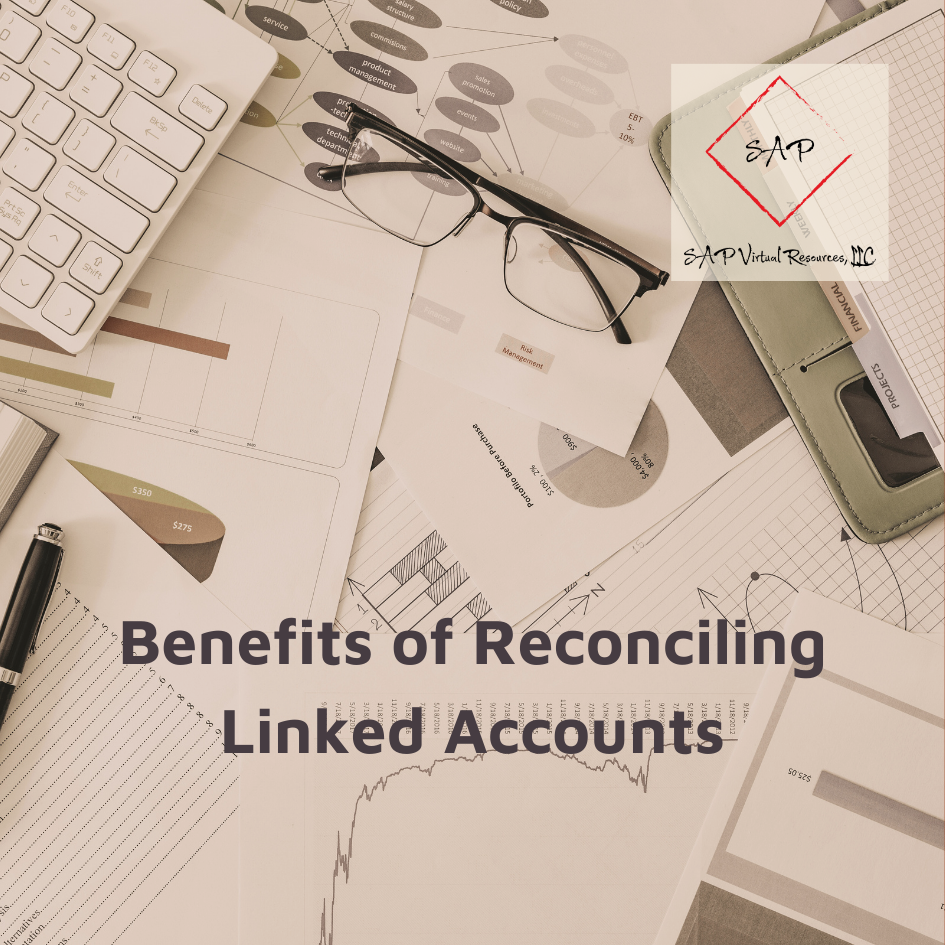
by Sarah | Jun 11, 2024 | Bookkeeping Basics, QuickBooks
If I have my bank accounts linked in QuickBooks, do I need to reconcile them?
Yes, you should be reconciling at least your bank accounts monthly. The biggest reasons are:
- Detect Fraud: To catch fraudulent charges as quickly as possible and report them to your bank, you need to be able to notice those charges. If you are not reviewing and reconciling your accounts with the bills you’ve entered into QuickBooks (or whatever accounting software you use), you can miss them. This is especially true if you run a lot of smaller or similar-priced transactions through your business.
- Catch Bank Feed Errors: Your bank feed can contain errors. I’ve seen accounts become unlinked and transactions not load. Recently, a client’s credit card charges were uploaded twice—once for the day the credit card was run, and again for the day it cleared the account. Your accounts and financial reports will tell you the wrong information without reconciling the account to catch these issues.
- Correct Human Errors: You can add human error if you write out your checks instead of printing them from your software and then typing the amounts into your accounting system. Reconciliation can help you find that $154 check that was keyed in as $145. The rule of thumb is if you’re off by something divisible by nine, it’s probably two numbers switched around. Sometimes, the error could also be on the bank’s side where something is misentered. You need to contact your bank to correct the information promptly.
- Ensure Tax Compliance: Incorrect numbers in your records can affect your tax reporting. Incorrect transactions could cause you to overpay or underpay your estimated or sales taxes.
- Avoid Overdrafts: Missing expenses in your bank feed can lead to spending money you don’t have, resulting in fees and penalties. This can especially happen if your cash flow is tight.
- Maintain Accurate Financial Statements: Having incorrect financial statements can cause you to make inaccurate assumptions about your current business finances and could lead to choices that cause issues in your business.
By regularly reconciling your accounts, you can rest assured that your financial records are accurate and up-to-date. This provides a solid foundation for managing and growing your business, giving you peace of mind.
by Sarah | Mar 19, 2024 | Uncategorized

As an LLC owner, you have several options for paying yourself, including draws and guaranteed payments. It’s crucial to understand how these methods work to ensure you’re compliant with tax laws and making the most of your hard-earned cash. In this blog post, we’ll break down the ins and outs of paying yourself as an LLC owner.
Draws
A draw is a payout of profits to LLC owners, typically taken throughout the year. Unlike a salary, draws aren’t subject to payroll taxes, but they are subject to income tax and self-employment tax.
Draws don’t count as a business expense, so they don’t lower your LLC’s taxable income. It’s also important to avoid taking excessive draws, as this can drain your business’s cash reserves and put it in a tough spot financially.

Guaranteed Payments for Partner LLC Owners
Guaranteed payments are especially relevant for LLCs with multiple owners, as they provide a way to compensate partners for their services to the company. These payments are considered a business expense, so they can be deducted from the LLC’s taxable income. Guaranteed payments are also subject to self-employment tax.
Partner LLC owners should consider the value of their services and compare it to industry standards when determining fair guaranteed payments. These payments should be reasonable and reflect the services provided by each partner to the LLC. Additionally, it’s essential to have a clear agreement in place that outlines the payment structure and how profits and losses will be shared among partners.
By understanding the role of guaranteed payments in a partner LLC, owners can ensure that everyone is compensated fairly and that the business is in compliance with tax laws.
S-Corporation Election
LLC owners can choose to be taxed as an S-corporation, which allows them to receive a salary through payroll. As an S-corporation owner, you’re considered an employee of your company, so your salary is subject to payroll taxes but not self-employment tax.
To elect S-corporation status, LLC owners must file Form 2553 with the IRS and meet specific criteria. While S-corporation election can offer tax benefits for some LLC owners, it also involves additional administrative and compliance responsibilities. It’s essential to consult with a tax professional before making this decision.
.

Takeaway
Getting paid as an LLC owner requires careful consideration of tax laws and financial implications. Draws and guaranteed payments are common methods for LLC owners to receive compensation, and S-corporation election is another option for those who qualify. By understanding the pros and cons of each method and consulting with a tax professional, LLC owners can make informed decisions that support their financial goals and ensure compliance with tax laws.
by Sarah | Mar 19, 2024 | Uncategorized

Avoiding Costly Scams When Starting Your Business: Tips for Protecting Your Wallet
Starting a new business is an exciting and challenging journey, but it’s essential to be aware of potential scams that can drain your wallet and derail your progress. Some unscrupulous individuals and companies prey on new business owners, offering “helpful” services that are unnecessary or overpriced. In this blog post, we’ll explore some common scams to avoid and provide tips for protecting your hard-earned money.
Don’t Pay for an EIN
One of the first things you’ll need to do when setting up a business is to obtain an Employer Identification Number (EIN) from the IRS. While some websites may offer to obtain an EIN for you for a fee, this is a scam. The IRS provides EINs for free, and the application process is straightforward and can be completed online in just a few minutes. Don’t pay for something you can get for free!

Beware of Phantom Corporate Setup Fees
Another common scam involves companies charging exorbitant fees to set up a corporation or LLC for you. While there are legitimate companies that offer these services, some will charge hundreds or even thousands of dollars for something you can do yourself for a fraction of the cost. Before paying for these services, research your state’s requirements for forming a business entity and consider doing it yourself or hiring a reputable attorney to help.
Avoid Fake Business Licenses and Permits
Some scammers may try to sell you fake business licenses or permits that you don’t actually need. Before paying for any licenses or permits, check with your state and local governments to determine which ones are required for your business. In most cases, you can obtain these directly from the government agency at a much lower cost than what scammers are charging.

Tips for Protecting Yourself
To avoid falling victim to business setup scams, keep these tips in mind:
- Research your state’s requirements for setting up a business entity and obtaining necessary licenses and permits.
- Be skeptical of companies that promise to expedite the process or offer services that seem too good to be true.
- Don’t pay for something you can get for free, such as an EIN.
- Read reviews and check the Better Business Bureau before hiring a company to help with business setup.
- Consider working with a reputable attorney or accountant who specializes in small business services.
Starting a business is a big undertaking, and it’s natural to feel overwhelmed or unsure at times. However, by staying informed and cautious, you can avoid falling prey to scams and focus on building a successful and thriving business. Remember, if something seems too good to be true, it probably is. Trust your instincts and do your research before handing over your hard-earned money.
by Sarah | Mar 19, 2024 | Uncategorized

Why You Shouldn’t Mix Business and Personal Finances
As a small business owner, you might be tempted to use your personal bank account for business expenses or to make personal purchases with your business credit card. However, mixing your business and personal finances can cause significant problems that could cost you time, money, and even your limited liability status. In this blog post, we’ll explore a few of the reasons why it’s crucial to keep your business and personal finances separate.
Lost Expense Deductions
One of the biggest advantages of having a small business is the ability to deduct business-related expenses from your taxable income. However, if you’re using your personal bank account for business expenses, it can be challenging to prove which expenses were exclusively for business purposes. As a result, you could miss out on valuable tax deductions, costing you more money in taxes.

Commingling Funds Can Pierce the Corporate Veil
If you own a limited liability company (LLC) or corporation, you likely chose that business structure to protect your personal assets from business liabilities. However, if you’re using your personal bank account for business expenses or making personal purchases with your business credit card, you could be inadvertently blurring the line between your business and personal finances. In legal terms, this is known as “commingling funds,” and it can put your personal assets at risk by piercing the corporate veil.
If your business is ever sued or can’t pay its debts, a court could determine that your LLC or corporation is just an extension of your personal finances, and therefore, your personal assets are fair game for creditors.
Difficulty Tracking Business Performance
Another reason to keep your business and personal finances separate is that it makes tracking your business performance much more difficult. If your business and personal expenses are all mixed together, it’s hard to determine how much revenue your business is generating and whether it’s profitable. By keeping your finances separate, you’ll have a clearer picture of your business’s financial health, making it easier to make informed decisions and plan for the future.

Tips for Keeping Business and Personal Finances Separate
If you’ve been mixing your business and personal finances, now is the time to make a change. Here are a few tips to help you keep your finances separate:
- Open a business bank account and use it exclusively for business transactions.
- Apply for a business credit card and use it only for business expenses.
- Use accounting software to track your business income and expenses separately from your personal finances.
- Set up a separate business entity, such as an LLC or corporation, to further separate your business and personal finances.
Keeping your business and personal finances separate might seem like a hassle at first, but it’s essential to protect your assets and take advantage of tax benefits.
by Sarah | Mar 19, 2024 | Uncategorized

Stacy’s Success Story: Streamlining Finances for a Booming Catering Business
Stacy, the proud owner of a startup catering business, faced challenges in organizing her finances. With business transactions scattered across personal and business accounts and multiple payment methods, it became difficult for her to keep track of everything effectively. Stacy sought our assistance to achieve a clearer, more efficient financial management system.
Challenges Faced
Stacy’s finances were disorganized due to:
- Mixing personal and business funds, making it challenging to differentiate between them.
- Incomplete tracking of expenses in QuickBooks, leading to potential inaccuracies in financial reports.
- Use of multiple credit cards and payment methods, causing difficulties in tracking expenses and income as well as maintaining records.

The Solution
Our team began by identifying the key areas in need of improvement, then devised a plan tailored to Stacy’s catering business. Here’s how we streamlined her financial management:
- Separating Personal and Business Finances: We helped Stacy set up separate bank accounts and credit cards exclusively for her catering business, ensuring a clear separation of finances. This made tracking business expenses and income more manageable and efficient.
- Expense Tracking and Documentation: We assisted Stacy in recording all personal funds invested into her business, along with any personal loans. This included ensuring all expenses were correctly categorized and documented, contributing to a more accurate financial picture.
- Mileage and Gas Purchases: We worked with Stacy to document and categorize her mileage and gas purchases to determine whether it made better sense to take the mileage deduction or actual costs deduction for her business and making sure they were accurately represented in her financial records.
- Financial Reporting: By organizing Stacy’s finances, we were able to generate reliable financial reports that provided valuable insights into her business’s performance. These reports could then be used for filing taxes and making informed decisions.

Impact
With a more streamlined approach to managing her business finances, Stacy now enjoys:
Accurate and efficient tracking of expenses, allowing her to make better-informed financial decisions.
Time-saving processes due to the separation of personal and business finances.
Reduced stress and improved focus on her core business operations.
Through our tailored financial management solutions, Stacy’s catering business is now better equipped to handle its finances and focus on what matters most: delivering exceptional catering services to its clients.
Interested in how we can help your business through tailored financial management solutions?
Book a free consultation now.
Book Now













